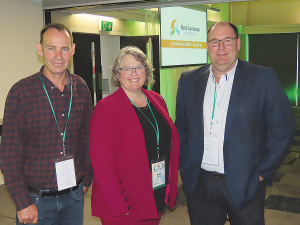Rural contractors deserve to be listened to on safety issues created by new roading developments which don’t allow motorists to pass slow-moving vehicles, says Associate Agriculture Minister Andrew Hoggard.
Opening the Rural Contractors NZ conference in Masterton recently, Hoggard says he sees the issues when he drives to Parliament from his Manawatū home.
There were median barriers preventing overtaking between Levin and Otaki as well as no shoulder space to allow vehicles such as tractors to pull over.
“There’s a lot of tractors trying to get in and out of paddocks,” he told the conference. Motorists were getting angry as a result.
“There’s lots of screaming, fingers out the windows and potentially stupid decisions being made.”
Roading developments needed to allow traffic to get past slow-moving machinery.
He promised to take up the issue of providing for slow-moving machinery with Transport Minister Simeon Brown.
Rural Contractors NZ chief executive Andrew Olsen says the issue is not limited to Horowhenua.
“Rural contractors in Waikato and other parts of the country are facing similar anger from motorists because of median barriers and no pull over space.”
Near where he lives south of Masterton, there are several kilometres of median barriers on SH2, accompanied by poor capacity for agricultural machinery to pull over safely.
“We support reducing the road toll but giving rural contractors no capacity to pull over for kilometres at a time is actually adding to the risk of fatalities. We want Minister Brown to act,’’ says Olsen.
Triple messages on the risks posed by to rural contactors by fatigue and accidents were also given at the annual RCNZ conference.
Safer Farms chair Lindy Nelson said these are part of a problem rural New Zealand can no longer ignore.
“The agriculture sector is one of the most important primary industries contributing to New Zealand’s economy, yet it is one of the most dangerous places to work.”
There had been a dozen farm bike fatalities alone reported to Work- Safe since last November. “Unfortunately, I think this is going to be our worst year yet for farm bike fatalities.”
Nelson says farmers could not work without rural contractors but sometimes put them under a lot of pressure and the risk of accidents caused by fatigue.
“Be brave and talk to one another about what that looks like.”
Her comments were echoed the following day of the conference by Wairarapa psychologist and regional Rural Support Trust area coordinator Sarah Donaldson.
She’d had a call the previous morning from someone in the industry who was under stress. The call was one of many she received from farmers and rural contractors.
“The vast majority of people I see are staunch blokes,” says Donaldson.
Fatigue was the biggest issue. “Crash and burn – that’s about 75% of what I see in the rural sector,” she adds.
Donaldson reminded rural contractors that their body and brain needed recovery time from work – and work included being on phones and laptops as well as machinery.
Good sleep was a key to recovery but people under stress often had difficulty finding their ‘off’ button.
Pre-season conversations with farmers were important to try and set up things well.
WorkSafe’s Paula MacKenzie says farmers were often just as stressed as rural contractors and they needed to know the risks for them and others increased if too much pressure to do a job was applied.
She outlined 15 factors contributing to fatigue including long hours, uncertain work times and operating machinery.
Rural contractors at the conference confirmed they faced most of the 15 factors in their work.
Waikato’s Helen Slattery, who has been RCNZ president for three years, stood down to be replaced by Wairarapa’s Clinton Carroll. South Waikato’s Gordy Brown, Taranaki contractor Alistair Kalin and Canterbury spray contractor David Molloy join the RCNZ board.



















